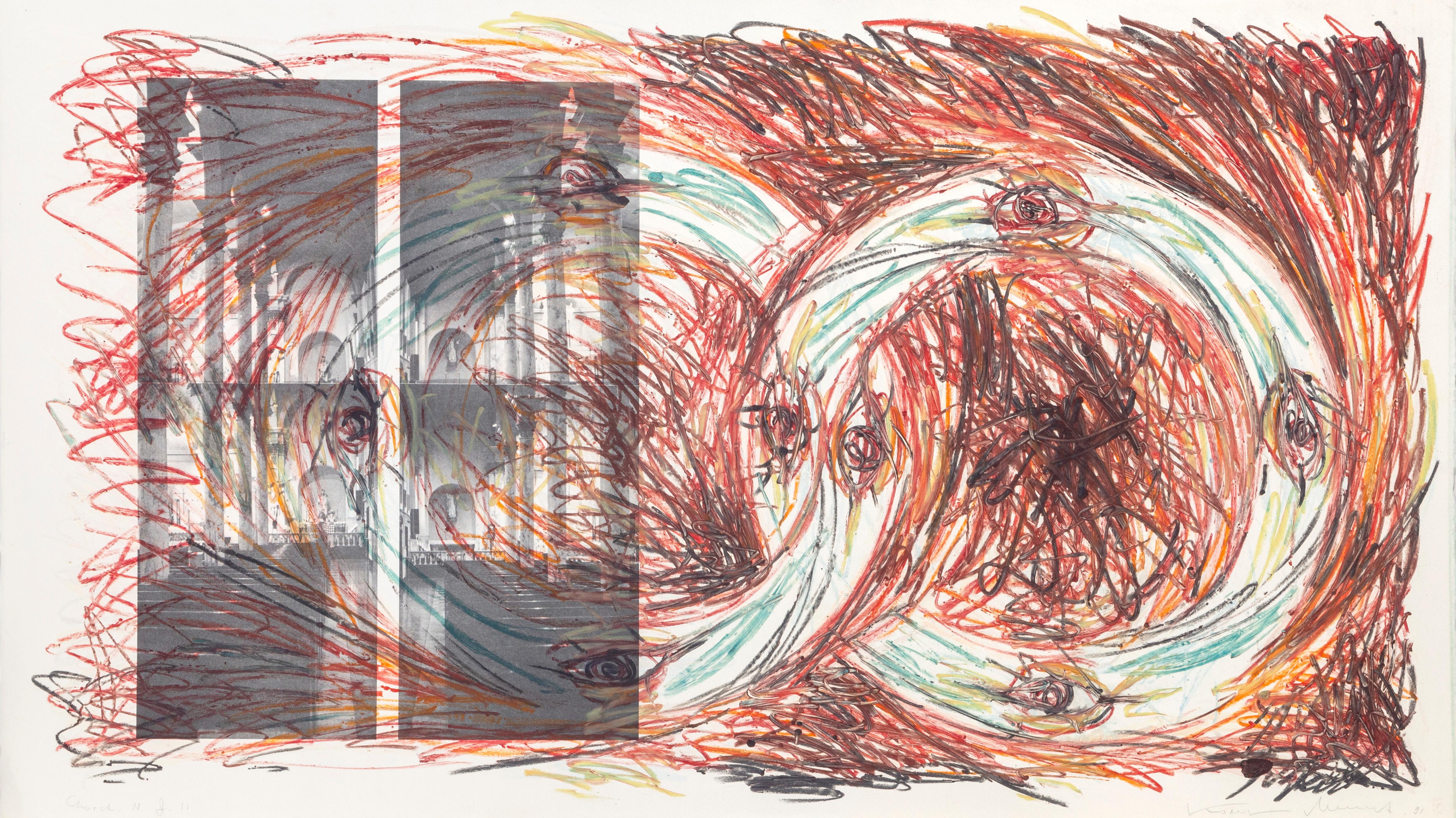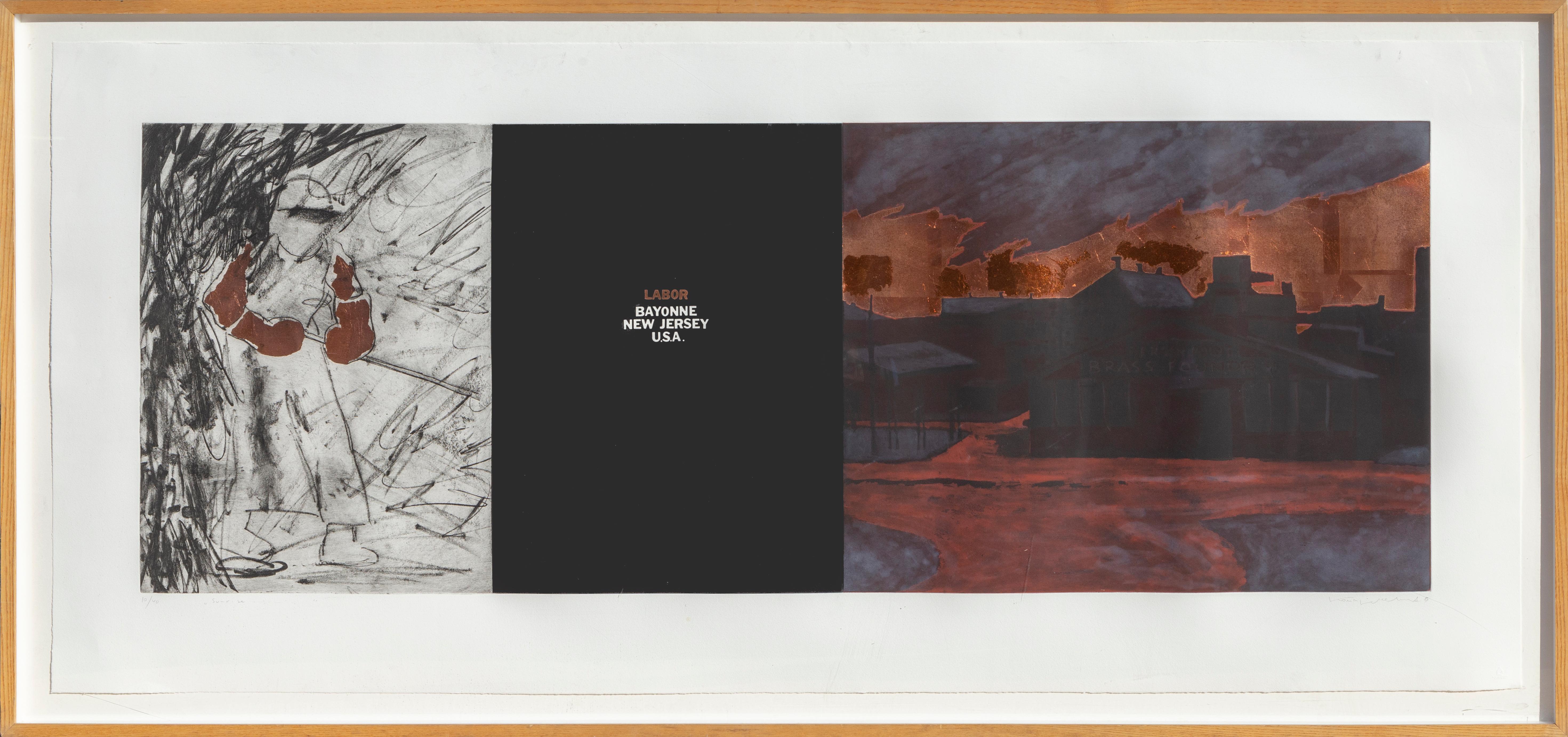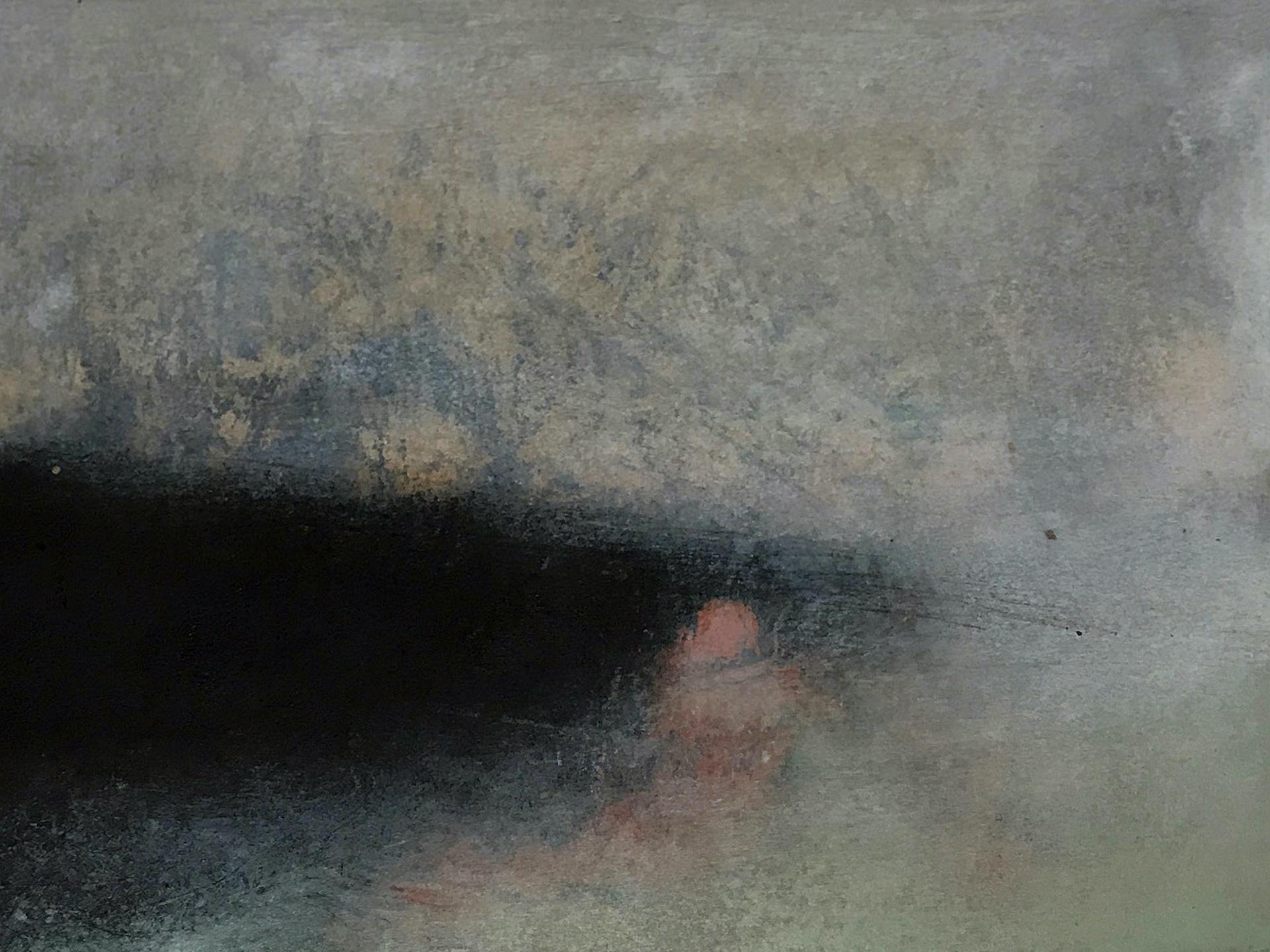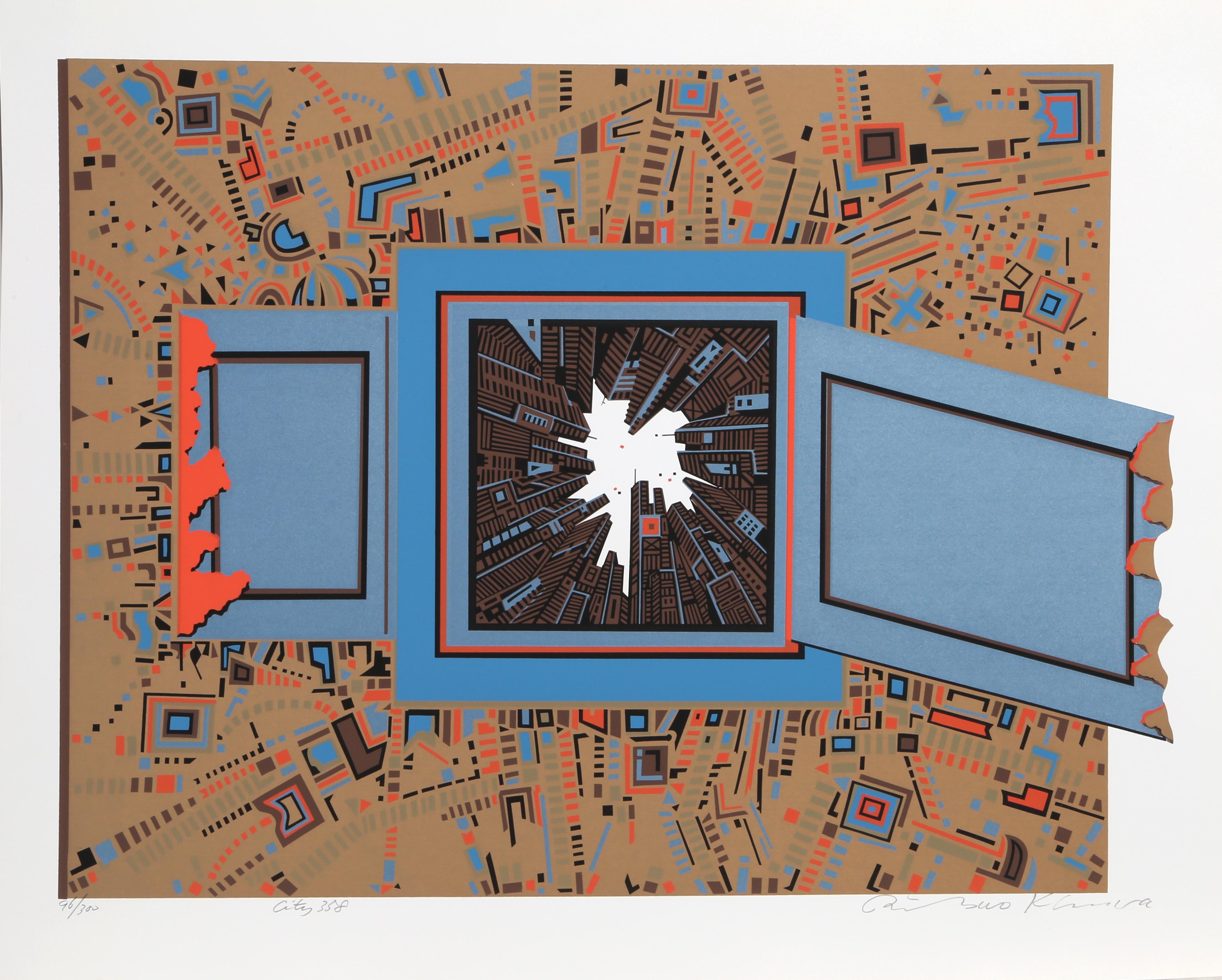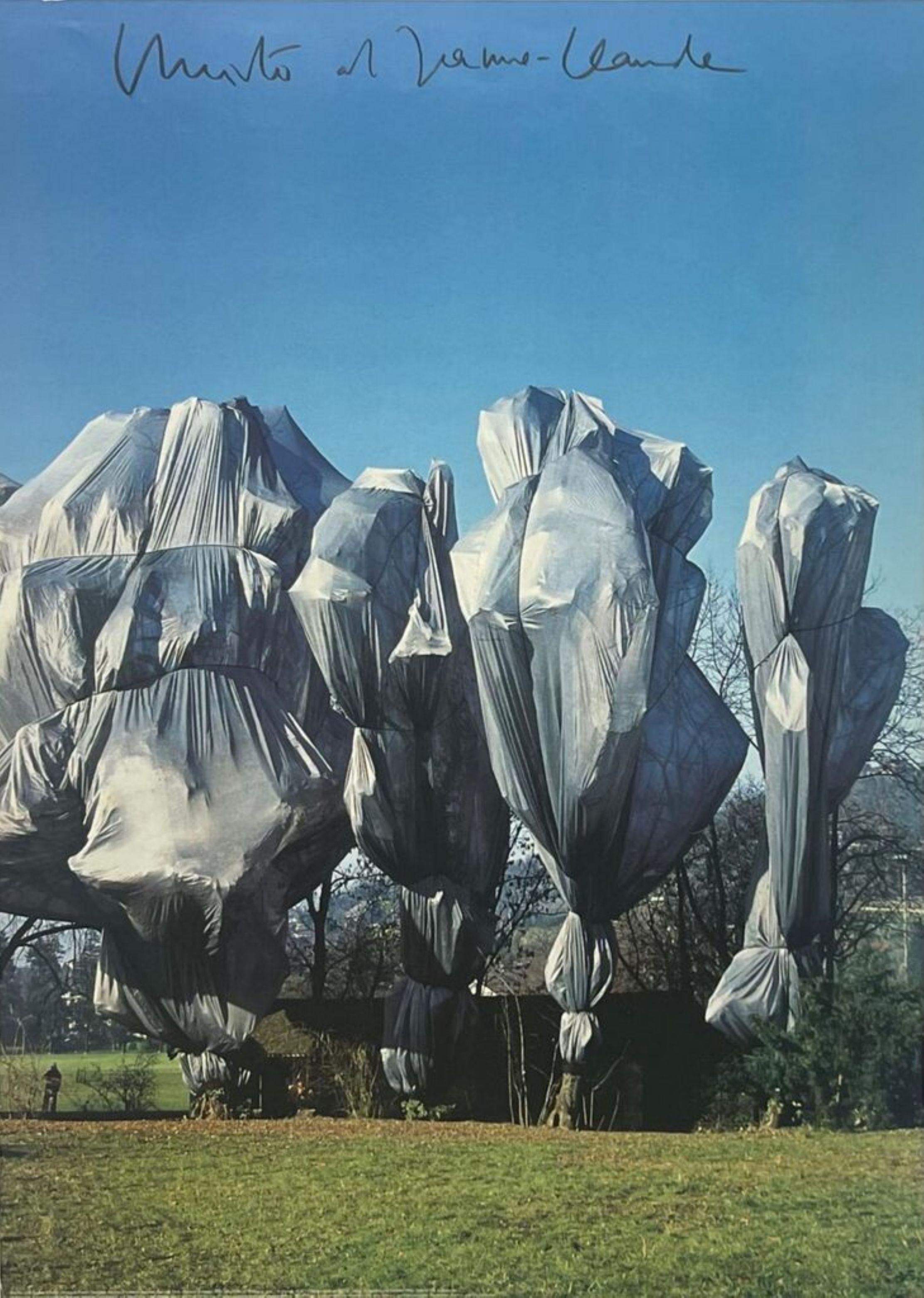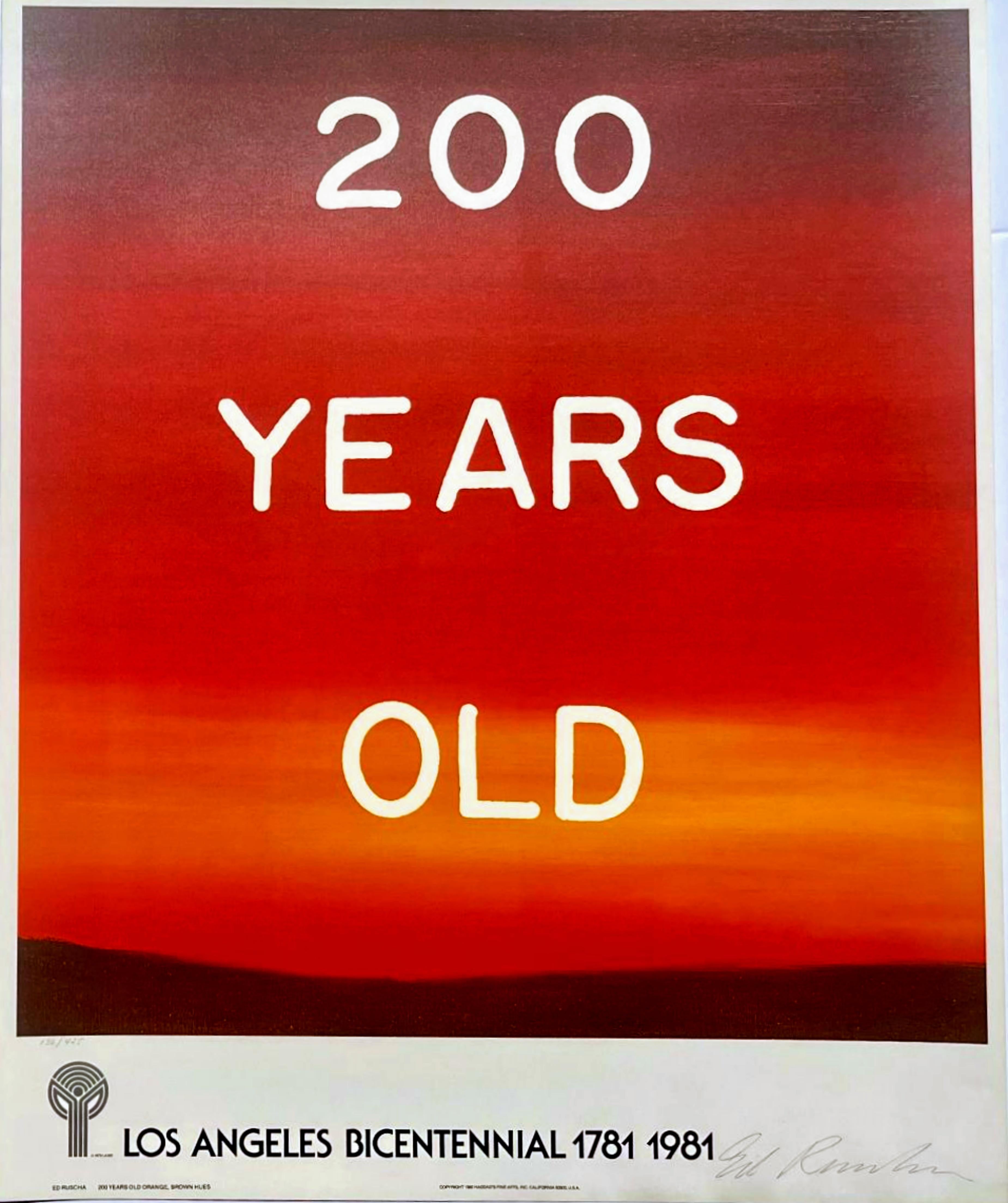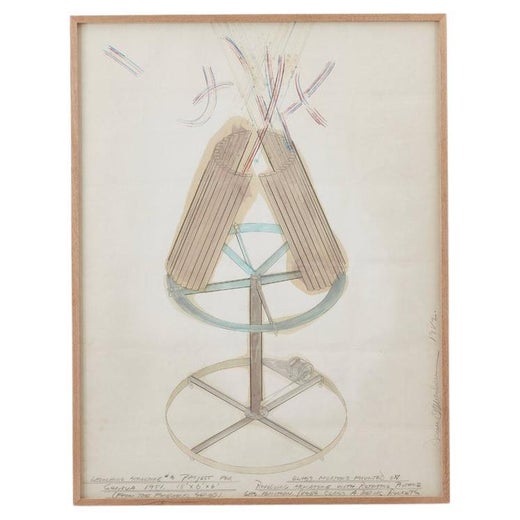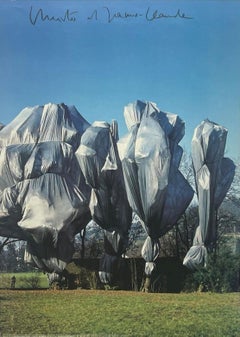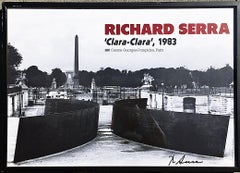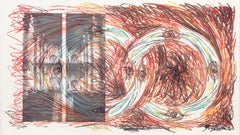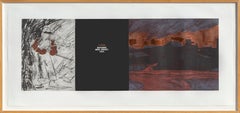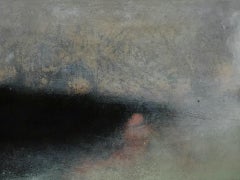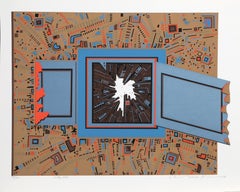Items Similar to Yvon Lambert Gallery Poster (Hand Signed and Addressed by Dennis Oppenheim)
Want more images or videos?
Request additional images or videos from the seller
1 of 8
Dennis A. OppenheimYvon Lambert Gallery Poster (Hand Signed and Addressed by Dennis Oppenheim)1969
1969
About the Item
Dennis Oppenheim
Directed Seeding -Wheat, Historic Yvon Lambert Gallery Poster (Hand Signed and Addressed by Dennis Oppenheim), 1969
Offset lithograph poster. Hand signed, inscribed. Postmarked and addressed to Oppenheim's dealer, John Gibson
23 × 16 inches
Hand Signed and inscribed by Dennis Oppenheim lower right in blue marker in 2006, hand addressed by Dennis Oppenheim in 1969 in red marker
Unframed
This is an extremely uncommon vintage poster/mailer announcing the May 20th, 1969 opening reception (Vernissage) for the exhibition of works by American conceptual art pioneer Dennis Oppenheim at the Yvon Lambert Gallery in Paris. The poster is historic in that it was originally mailed to John Gibson, the East 67th Street dealer, who famously gave Dennis Oppenheim his first New York exhibition in 1968, and it is hand addressed to Gibson, bearing the original Paris, France postmark of 1969. It is, exceptionally, hand signed and dedicated by Dennis Oppenheim to a collector who acquired the poster from John Gibson's collection, and then secured Dennis Oppenheim's autograph in 2006, making this an especially valuable collectors item.
More information about the project from the Tate Gallery archives, which acquired the work:
This work brings together two interventions Oppenheim created on a field owned by farmer Albert Waalken in Finsterwolde, north-eastern Holland, in 1969. It comprises four distinct elements mounted on board: a colour photograph of a wheatfield being sowed by a tractor in parallel curving lines seen from high up; a negative image in black and white of a map of the area of Finsterwolde onto which two sections of text have been collaged; and two black and white aerial photographs of the same field being traversed by a tractor cutting an X into the wheat. The first two elements relate to the action Directed Seeding. For this the field was seeded according to a line plotted by following the road from the village of Finsterwolde, the location of the field, to Nieuweschans, another village where the farmer’s storage silo for wheat was located. Oppenheim reduced this curved line by a factor of six in order to direct the trajectory of seeding. The tractor then carved a series of curved parallel lines on the surface of the field as it dug up earth and scattered seed. From an aerial perspective the patterning of parallel lines may be viewed as a form of line drawing on the landscape. The precise location of the field and the silo are indicated on the map, showing the trajectory of the road. The two sections of text collaged onto the upper portion of the map briefly describe the two interventions. Explaining the action Cancelled Crop, the artist wrote:
In September the field was harvested in the form of an X. The grain was isolated in its raw state, further processing was withheld. This project poses an interaction upon media during the early stages of processing. Planting and cultivating my own material is like mining ones own pigment (for paint) – I can direct the later stages of development at will. In this case the material is planted and cultivated for the sole purpose of withholding it from a product-oriented system. Isolating this grain from further processing (production of food stuffs) becomes like stopping raw pigment from becoming an illusionistic force on canvas. The esthetic is in the raw material prior to refinement, and since no organization is imposed through refinement, the material’s destiny is bred with its origin.
(Quoted from artist’s statement in Tate acquisition file.)
Directed Seeding and Cancelled Crop are two separate works, brought together in several different versions of which Tate’s is one. The collage presents three ways in which human action may marks the land. For the first two, agricultural machinery is used to create straight lines, in the process of harvesting as in the X of Cancelled Crop, or curved lines, during the process of planting seed in the contours photographed for Directed Seeding. The map shows a third (and more ancient) way of marking the land, through the construction of roads. The use of the landscape – natural, industrial or urban – as a canvas on which to act is typical of Oppenheim’s work in the late 1960s and early 1970s. In a related action, Directed Harvest, 1966 (Tate T07590) and Directed Harvest 1968 (Kröller-Müller Museum, Otterlo, Netherlands), the artist caused a field to be harvested in linear patterns which he then had photographed in its progressive stages. In Reverse Processing: Cement Transplant, East River, NY, 1970, 1978 (Tate T07591) Oppenheim drew large crosses on the roofs of barges transporting raw cement that he found moored on the New York East River banks. All these works centre on process as an agent of change and utilise materials, elements and locations on which the artist can have no permanent claim, making them deliberately ephemeral. Such actions as seeding a crop and harvesting it several months later operate within time parameters dependent on the cycles of the seasons rather than the will of man, mixing human processes with those of nature. Oppenheim’s analogy between the prevention of a crop from entering the food chain and the halting of the expressive, ‘illusionistic’ force of paint deconstructs the sophisticated processes of art-making and the food industry to the elemental notion of making simple marks on the environment. In this way, the artist highlights contemporary man’s dependency on complex chains of processes increasingly removed from direct human agency through the use of machines. Oppenheim’s use of the section of road to plot the trajectory of seeding recalls an important early work by Marcel Duchamp (1887-1968). For his 3 Standard Stoppages, 1913-14 (see Tate T07507), Duchamp dropped three one-metre lengths of string onto sections of canvas, fixing them as they fell and using the curved lines they delineated as the bases for three new ‘metre’ lengths. He subsequently utilised their contours to map trajectories of various elements in his most famous work, The Bride Stripped Bare by her Bachelors, Even (The Large Glass), 1915-23 (see Tate T02011).
Unframed
- Creator:Dennis A. Oppenheim (1938, American)
- Creation Year:1969
- Dimensions:Height: 23 in (58.42 cm)Width: 16 in (40.64 cm)
- Medium:
- Movement & Style:
- Period:
- Condition:Folded, as issued and mailed, with original postmark and aging/handling; some paper loss around creases (see image); otherwise good, stable vintage condition.
- Gallery Location:New York, NY
- Reference Number:1stDibs: LU1745210858222
Dennis A. Oppenheim
ennis Oppenheim (Electric City, September 6, 1938 - New York, January 21, 2011) was an American sculptor, conceptual artist, performance artist, land art artist and photographer. He earned his BFA from the California College of Arts and Crafts in Oakland, California in 1964 and an MFA from Stanford University in Palo Alto, California in 1965. He moved to New York in 1966, where he first taught art at various schools, before having solo exhibitions in New York in 1968 when he was 30. Oppenheim's early work tended to focus on performances of humans and animals in his shows. In the early 1970s, he was a forerunner in the use of video and film in his performances. Around 1980, Oppenheim shifted his focus from body art and performances to the creation of monumental conceptual arts installations. He participated in both the Venice Biennale and the Johannesburg Biennale in 1997. The artist lived and worked in New York and had been married to American sculptress Alice Aycock since 1982. He died on January 21, 2011 from liver cancer. Oppenheim was represented in the Netherlands with a monumental work in the Sculpture Park of the Kröller-Müller Museum in Otterlo: Station for detaining and blinding radioactive horses, stage II (1981-1982). Due to the poor condition of the work in 1990, it was decided to return it to the artist in 1992. In 1996, a selection of Oppenheim's work was shown in a summer exhibition.
About the Seller
5.0
Platinum Seller
Premium sellers with a 4.7+ rating and 24-hour response times
Established in 2007
1stDibs seller since 2022
416 sales on 1stDibs
Typical response time: 2 hours
- ShippingRetrieving quote...Shipping from: New York, NY
- Return Policy
Authenticity Guarantee
In the unlikely event there’s an issue with an item’s authenticity, contact us within 1 year for a full refund. DetailsMoney-Back Guarantee
If your item is not as described, is damaged in transit, or does not arrive, contact us within 7 days for a full refund. Details24-Hour Cancellation
You have a 24-hour grace period in which to reconsider your purchase, with no questions asked.Vetted Professional Sellers
Our world-class sellers must adhere to strict standards for service and quality, maintaining the integrity of our listings.Price-Match Guarantee
If you find that a seller listed the same item for a lower price elsewhere, we’ll match it.Trusted Global Delivery
Our best-in-class carrier network provides specialized shipping options worldwide, including custom delivery.More From This Seller
View AllWrapped Trees, Switzerland poster (Hand Signed by Christo and Jeanne-Claude)
By Christo
Located in New York, NY
Christo and Jeanne-Claude, Christo, Javacheff Christo
Wrapped Trees, Switzerland poster (Hand Signed by Christo and Jeanne-Claude), 1998
Offset lithograph (hand signed)
Signed Christ...
Category
1990s Pop Art Abstract Prints
Materials
Lithograph, Offset
Ed Ruscha Los Angeles Bicentennial: 200 Years Old Rare SIGNED & NUMBERED edition
By Ed Ruscha
Located in New York, NY
Ed Ruscha
200 Years Old, 1980
Offset lithograph
Hand signed and numbered 132/425 by Ed Ruscha in graphite pencil on the front
30 1/2 × 25 inches
Unframed
Bibliography:
ED RUSCHA: AN ARCHIVE OF PROJECTS, 2023, pg 149.
Publisher:
Haddad's Fine Arts, Inc., California, USA
This is a quintessential Los Angeles print - celebrating the 200th anniversary of the City of Angels; a wonderful, classic Ruscha image. It was commissioned by LA200 for the 1981 Los Angeles Bicentennial, and is based upon an original drawing that Ruscha created for the project. Ruscha's lifelong artistic preoccupation has been a thought-experiment on the theme of the decline of American civilization, so naturally Los Angeles would be represented as a sunset (not a sunrise); the image is also perhaps a subtle reference to Sunset Boulevard - a geographical location as well as the title of an iconic Hollywood movie.
This work is pencil signed and numbered from the limited edition of only 425. A must have for any Ruscha fans with a connection to this legendary West Coast city.
Pop Art, Art with Text...
Category
1980s Pop Art Landscape Prints
Materials
Pencil, Graphite, Lithograph, Offset
Clara, Clara (Hand Signed by Richard Serra) Rare vintage Centre Pompidou poster
By Richard Serra
Located in New York, NY
Richard Serra
Clara, Clara (Hand Signed by Richard Serra), 1983
Offset Lithograph Poster (Hand signed by Richard Serra)
Boldly signed with black marker on the front
Frame Included: held in original vintage 1980s frame
This is the rare vintage offset lithograph poster of Richard Serra's 1983 work "Clara Clara", exhibited at the Pompidou Center in France in 1983-1984. Very collectible when hand signed by Richard Serra!
Accompanied by gallery issued Certificate of Guarantee
Measurements:
Frame:
27.5 x 37.75 x 1 inch
Print:
25.5 x 35.75 inches
About Richard Serra:
Obsession is what it comes down to. It is difficult to think without obsession, and it is impossible to create something without a foundation that is rigorous, incontrovertible, and, in fact, to some degree repetitive. Repetition is the ritual of obsession. Repetition is a way to jumpstart the indecision of beginning. To persevere and to begin over and over again is to continue the obsession with work. Work comes out of work. In order to work you must already be working.
—Richard Serra
One of the most significant artists of his generation, he has produced large-scale, site-specific sculptures for architectural, urban, and landscape settings spanning the globe, from Iceland to New Zealand.
Born in 1938 in San Francisco, Richard Serra lives and works in New York and on the North Fork of Long Island. Serra attended the University of California, Berkeley before transferring to the University of California, Santa Barbara graduating with a BA in English literature; he then studied painting at Yale University, New Haven, Connecticut completing both a BFA and MFA. He began showing with Leo Castelli in 1968, and his first solo exhibition in New York was held at the Leo Castelli Warehouse the following year. His first solo museum exhibition was held at the Pasadena Art Museum, California, in 1970.
Serra’s sculptures and drawings have been celebrated with two retrospectives at the Museum of Modern Art, New York, twenty years apart: Richard Serra/Sculpture (1986) and Richard Serra Sculpture: Forty Years (2007). He has had solo exhibitions at the Stedelijk Museum, Amsterdam (1977–78); Kunsthalle Tübingen, Germany (1978); Staatliche Kunsthalle Baden-Baden, Germany (1978); Museum Boijmans Van Beuningen, Rotterdam, Netherlands (1980, 2014, and 2017); Centre Pompidou, Paris (1983–84); Museum Haus Lange, Krefeld, Germany (1985); Louisiana Museum, Humlebæk, Denmark (1986); Westfälisches Landesmuseum für Kunst und Kulturgeschichte, Münster, Germany (1987); Städtische Galerie im Lenbachhaus, Munich (1987); Stedelijk Van Abbemuseum, Eindhoven, Netherlands (1988); Bonnefantenmuseum, Maastricht, Netherlands (1990); Kunsthaus Zürich (1990); CAPC Musée d’Art Contemporain, Bordeaux, France (1990); Museo Nacional Centro de Arte Reina Sofía, Madrid (1992); Kunstsammlung Nordrhein-Westfalen, Düsseldorf, Germany (1992); Dia Center for the Arts, New York (1997); Centro de Arte Hélio Oiticica, Rio de Janeiro (1997–98); Trajan’s Market, Rome (1999–2000); Pulitzer Arts Foundation, St. Louis (2003); and Museo Archeologico Nazionale di Napoli, Naples, Italy (2004).
In 2005 The Matter of Time (1994–2005), a series of eight large-scale works, was installed permanently at the Guggenheim Museum Bilbao, Spain. For Monumenta 2008, the major site-specific installation Promenade was shown at the Grand Palais, Paris. Three years later the large-scale, site-specific sculpture 7 was permanently installed opposite the Museum of Islamic Art in Doha, Qatar. A major traveling retrospective dedicated to Serra’s drawings was presented at the Metropolitan Museum of Art, New York, San Francisco Museum of Modern Art, and the Menil Collection, Houston (the organizing venue), from 2011 to 2012.
In 2014 the Qatar Museums Authority presented a two-venue retrospective survey of Serra’s work, and East-West/West-East (2014) was permanently installed in the Brouq Nature Reserve, Zekreet, Qatar. In 2017 the Museum Wiesbaden, Germany, presented Richard Serra: Props, Films, Early Works; an overview of Serra’s work in film and video was shown at the Kunstmuseum Basel; and recent drawings were featured at the Museum Boijmans Van Beuningen.
Serra has participated in numerous major international exhibitions, including Documenta (1972, 1977, 1982, and 1987), and the Biennale di Venezia (1980, 1984, 2001, and 2013), and his work has been included in many Whitney Annuals and Biennials (1968, 1970, 1973, 1977, 1979, 1981, 1995, and 2006). He is the recipient of the Leone d’Oro for lifetime achievement, Biennale di Venezia, Venice (2001); Orden Pour le Mérite...
Category
1980s Minimalist Abstract Prints
Materials
Permanent Marker, Lithograph, Offset
Wrapped Trees, Switzerland poster (Hand Signed by Christo and Jeanne-Claude)
By Christo and Jeanne-Claude
Located in New York, NY
Christo and Jeanne-Claude, Christo, Javacheff Christo
Wrapped Trees, Switzerland (Hand Signed by Christo and Jeanne-Claude), 1998
Offset lithograph poster (Hand Signed)
Signed Christ...
Category
1990s Pop Art Landscape Prints
Materials
Lithograph, Offset
Fagends Carved in Rock, De-Accessioned from the Denver Art Museum
By Claes Oldenburg
Located in New York, NY
Claes Oldenburg
Fagends Carved in Rock, De-Accessioned from the Denver Art Museum (137, Axsom and Platzker), 1975
Offset Lithograph. Hand signed and ...
Category
1970s Pop Art Abstract Prints
Materials
Graphite, Lithograph, Offset
East-West/West-East in Brouq Nature Reserve Qatar (Hand Signed by Richard Serra)
By Richard Serra
Located in New York, NY
Richard Serra
East-West/West-East: A Permanent in the Brouq Nature Reserve, Qatar (Hand Signed by Richard Serra), ca. 2014
Superb provenance: donated by the artist to a major contemporary art organization
Very rare offset lithograph (Hand Signed by Richard Serra)
Boldly signed on the front in black marker by Richard Serra
24 × 36 inches
Unframed
Sscarce when hand signed by Richard Serra. This work depicts Serra's iconic permanent installation in the desert of Brouq Qatar: East-West/West-East, which has become a famous landmark in Qatar since its installation in 2014. According to the Jewish-born Richard Serra, he had been visiting Qatar for about 12 years, during which he was introduced to the Chairperson of the Qatari Museums Authority and the sister of the new Emir, Sheikha Mayassa, by the architect of the Museum of Islamic Art, IM Pei. It was Sheikh Mayassathat who urged Serra to build a sculpture in the desert. The artist once said it was the most important thing he had ever done. In 2020 the Serra sculpture was famously vandalized.
This hand signed print has superb provenance as it was donated directly by the artist to a major charitable foundation and is accompanied by a documentation from a Foundation as well as a COA from the gallery.
Richard Serra biography:
Obsession is what it comes down to. It is difficult to think without obsession, and it is impossible to create something without a foundation that is rigorous, incontrovertible, and, in fact, to some degree repetitive. Repetition is the ritual of obsession. Repetition is a way to jumpstart the indecision of beginning. To persevere and to begin over and over again is to continue the obsession with work. Work comes out of work. In order to work you must already be working.
—Richard Serra
One of the most significant artists of his generation, he has produced large-scale, site-specific sculptures for architectural, urban, and landscape settings spanning the globe, from Iceland to New Zealand.
Born in 1938 in San Francisco, Richard Serra lives and works in New York and on the North Fork of Long Island. Serra attended the University of California, Berkeley before transferring to the University of California, Santa Barbara graduating with a BA in English literature; he then studied painting at Yale University, New Haven, Connecticut completing both a BFA and MFA. He began showing with Leo Castelli in 1968, and his first solo exhibition in New York was held at the Leo Castelli Warehouse the following year. His first solo museum exhibition was held at the Pasadena Art Museum, California, in 1970.
Serra’s sculptures and drawings have been celebrated with two retrospectives at the Museum of Modern Art, New York, twenty years apart: Richard Serra/Sculpture (1986) and Richard Serra Sculpture: Forty Years (2007). He has had solo exhibitions at the Stedelijk Museum, Amsterdam (1977–78); Kunsthalle Tübingen, Germany (1978); Staatliche Kunsthalle Baden-Baden, Germany (1978); Museum Boijmans Van Beuningen, Rotterdam, Netherlands (1980, 2014, and 2017); Centre Pompidou, Paris (1983–84); Museum Haus Lange, Krefeld, Germany (1985); Louisiana Museum, Humlebæk, Denmark (1986); Westfälisches Landesmuseum für Kunst und Kulturgeschichte, Münster, Germany (1987); Städtische Galerie im Lenbachhaus, Munich (1987); Stedelijk Van Abbemuseum, Eindhoven, Netherlands (1988); Bonnefantenmuseum, Maastricht, Netherlands (1990); Kunsthaus Zürich (1990); CAPC Musée d’Art Contemporain, Bordeaux, France (1990); Museo Nacional Centro de Arte Reina Sofía, Madrid (1992); Kunstsammlung Nordrhein-Westfalen, Düsseldorf, Germany (1992); Dia Center for the Arts, New York (1997); Centro de Arte Hélio Oiticica, Rio de Janeiro (1997–98); Trajan’s Market, Rome (1999–2000); Pulitzer Arts Foundation, St. Louis (2003); and Museo Archeologico Nazionale di Napoli, Naples, Italy (2004).
In 2005 The Matter of Time (1994–2005), a series of eight large-scale works, was installed permanently at the Guggenheim Museum Bilbao, Spain. For Monumenta 2008, the major site-specific installation Promenade was shown at the Grand Palais, Paris. Three years later the large-scale, site-specific sculpture 7 was permanently installed opposite the Museum of Islamic Art in Doha, Qatar. A major traveling retrospective dedicated to Serra’s drawings was presented at the Metropolitan Museum of Art, New York, San Francisco Museum of Modern Art, and the Menil Collection, Houston (the organizing venue), from 2011 to 2012.
In 2014 the Qatar Museums Authority presented a two-venue retrospective survey of Serra’s work, and East-West/West-East (2014) was permanently installed in the Brouq Nature Reserve, Zekreet, Qatar. In 2017 the Museum Wiesbaden, Germany, presented Richard Serra: Props, Films, Early Works; an overview of Serra’s work in film and video was shown at the Kunstmuseum Basel; and recent drawings were featured at the Museum Boijmans Van Beuningen.
Serra has participated in numerous major international exhibitions, including Documenta (1972, 1977, 1982, and 1987), and the Biennale di Venezia (1980, 1984, 2001, and 2013), and his work has been included in many Whitney Annuals and Biennials (1968, 1970, 1973, 1977, 1979, 1981, 1995, and 2006). He is the recipient of the Leone d’Oro for lifetime achievement, Biennale di Venezia, Venice (2001); Orden Pour le Mérite...
Category
2010s Minimalist Landscape Prints
Materials
Lithograph, Offset
You May Also Like
Church, NJ - Abstract Aquatint Etching by Komar & Melamid
By Komar & Melamid
Located in Long Island City, NY
Artist: Vitaly Komar, Russian (1943 - ) and Alexander Melamid, Russian (1945 - )
Title: Church, NJ
Year: 1991
Medium: Etching, signed, numbered, dated, and tilted in pencil
Paper Si...
Category
1980s Conceptual Landscape Prints
Materials
Etching, Aquatint
Sunrise at Bayonne, Framed Conceptual Aquatint Etching by Komar & Melamid
By Komar & Melamid
Located in Long Island City, NY
Artist: Vitaly Komar, Russian (1943 - ) and Alexander Melamid, Russian (1945 - )
Title: Sunrise at Bayonne
Year: 1988
Medium: Aquatint Etching with Metallic Leaf Collage, signed and ...
Category
1980s Conceptual Landscape Prints
Materials
Etching, Aquatint
$3,600 Sale Price
20% Off
Tim Southall, Destination Unknown, Contemporary Art Print, Affordable Art
By Tim Southall
Located in Deddington, GB
Tim Southall
Destination Unknown
Limited Edition Print
Edition of 45
Image Size: H 15cm x W 20cm
Sheet Size: H 26cm x W 32cm x D 0.1cm
Sold Unframed
Pleas...
Category
21st Century and Contemporary Conceptual Abstract Prints
Materials
Paper, Etching, Monoprint
City 358, Geometric Abstract Screenprint by Risaburo Kimura
By Risaburo Kimura
Located in Long Island City, NY
Artist: Risaburo Kimura, Japanese (1924 - )
Title: City 358
Year: 1971
Medium: Serigraph, signed and numbered in pencil
Edition: 300
Size: 23 x 28 in. (58.42 x 71.12 cm)
Category
1970s Conceptual Landscape Prints
Materials
Screen
$560 Sale Price
20% Off
Frankenthaler, Mary Mary 1991, New York City, Lincoln Center
By Helen Frankenthaler
Located in Fairfield, CT
Artist: After Helen Frankenthaler (1928-2011)
Title: Mary Mary (Lincoln Center Honorary)
Year: 1991
Medium: Offset lithograph poster on extra thick Somerset paper
Edition: 2000
Size...
Category
1990s Abstract Expressionist Landscape Prints
Materials
Lithograph, Offset
$1,036 Sale Price
20% Off
Miro, Oeuvres Graphiques, 1965 Galerie Maeght
By Joan Miró
Located in Fairfield, CT
Artist: After Joan Miro (1893-1983)
Title: Miro Oeuvres Graphiques
Year: 1965
Medium: Lithograph exhibition poster on wove paper
Size: 22.25 x 19.25 inches
Condition: Excellent
Notes...
Category
1960s Surrealist Landscape Prints
Materials
Lithograph, Offset
$636 Sale Price
20% Off
Recently Viewed
View AllMore Ways To Browse
French Food Posters
Vintage French Poster Food
Vintage Transport Signs
Vintage Construction Posters
Cycling Chain
Vintage Line Marker
Vintage Glass Cutting Board
Vintage Netherlands Poster
Mail Storage
Vintage Elementalism
Black Cutting Board
Esthetic Vintage
Vintage Curved Road
Vintage Dutch Barge
Leonardo Nierman Lithographs
Lewitt Pyramid
Loie Hollowell
Louise Nevelson Lead On Paper
